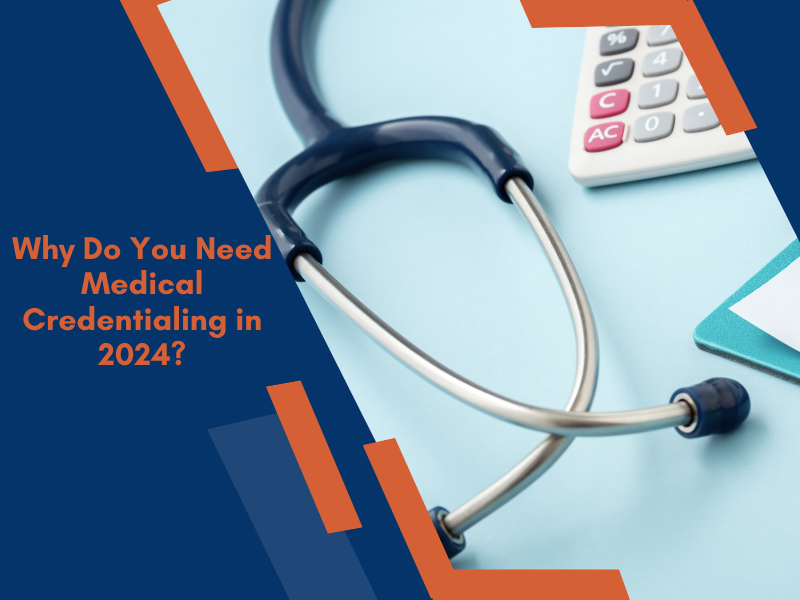In the fast-evolving healthcare landscape, medical credentialing has become a non-negotiable process for healthcare providers and institutions. As we move further into 2024, the significance of medical credentialing continues to rise, ensuring that healthcare professionals meet industry standards for education, training, and ethical practices. Whether you’re running a private practice, hospital, or clinic, medical credentialing is essential for maintaining a reputable and compliant healthcare service.
What is Medical Credentialing?
Medical credentialing is a process through which healthcare providers are evaluated to ensure they meet the necessary qualifications and standards to practice medicine. This process involves verifying a provider’s education, training, licenses, certifications, and work experience to ensure their credibility. Credentialing isn’t just limited to doctors but also applies to nurses, therapists, and other medical professionals.
In 2024, medical credentialing remains an integral part of the healthcare industry, establishing trust among patients, insurance companies, and healthcare organizations. By following a rigorous credentialing process, healthcare providers ensure that they meet the required medical, ethical, and legal standards of the profession.
The Importance of Medical Credentialing in 2024
1. Ensuring Patient Safety and Trust
One of the primary reasons medical credentialing is crucial in 2024 is the assurance it provides to patients. Healthcare is inherently built on trust, and patients need to feel confident that the person providing their care is qualified and capable. Credentialing guarantees that healthcare providers have undergone the necessary education and training to deliver high-quality care.
With the rise of telemedicine and the increasing number of patients seeking virtual consultations, ensuring that healthcare providers are properly credentialed has become even more important. Patients now have more choices than ever, and they are increasingly aware of the need to verify a provider’s qualifications before seeking care.
2. Compliance with Legal and Regulatory Standards
In 2024, the regulatory framework governing healthcare continues to grow more stringent. Medical credentialing plays a critical role in ensuring compliance with local, state, and federal regulations. Healthcare organizations are mandated to credential their providers to avoid legal issues, malpractice claims, and penalties.
Failing to properly credential healthcare providers can lead to legal repercussions, fines, or even the shutdown of a healthcare facility. To operate smoothly and stay compliant, medical credentialing is a necessity for all healthcare organizations.
3. Insurance Reimbursement and Network Inclusion
One of the most direct impacts of medical credentialing in 2024 is its role in securing insurance reimbursement. Insurance companies will only reimburse healthcare providers who are properly credentialed and enrolled in their networks. Without proper credentialing, a provider risks losing out on insurance reimbursements, which could have a detrimental effect on the financial health of their practice.
By ensuring that all healthcare providers within an organization are properly credentialed, the institution remains eligible for insurance reimbursements and can continue to provide care to patients with various insurance plans.
4. Maintaining a Competitive Edge
The healthcare market in 2024 is highly competitive, with patients becoming more discerning about where they seek care. A healthcare facility with fully credentialed providers is more likely to attract and retain patients than one that cannot demonstrate the qualifications of its staff. Patients will often research a provider’s background and credentials before scheduling an appointment, making it essential for healthcare providers to be transparent and up-to-date with their credentialing.
Additionally, insurance companies and other healthcare organizations are more likely to collaborate with credentialed professionals, allowing for better networking opportunities and business growth.
5. Mitigating Risks and Reducing Liability
Credentialing serves as a safeguard against potential risks that could arise from hiring or partnering with underqualified or unlicensed healthcare providers. In 2024, healthcare organizations face increased scrutiny from regulatory bodies, insurance companies, and patients. Any lapse in credentialing could result in significant legal and financial risks.
By adhering to a strict medical credentialing process, healthcare organizations reduce the risk of malpractice lawsuits, professional misconduct claims, and other legal liabilities. This not only protects the institution but also enhances the quality of care provided to patients.
6. Streamlining Operations in a Complex Healthcare Environment
The healthcare environment is becoming increasingly complex, with a growing number of regulatory requirements, insurance protocols, and technological advancements. Medical credentialing helps streamline operations by ensuring that only qualified and capable healthcare professionals are employed or contracted.
As more healthcare organizations embrace digital health solutions, credentialing plays a pivotal role in ensuring that providers, whether in-person or virtual, are qualified to practice. This helps ensure a seamless patient experience and operational efficiency, allowing healthcare providers to focus on patient care rather than administrative hurdles.
Trends in Medical Credentialing for 2024
1. Technology-Driven Credentialing
As with many aspects of healthcare, technology is transforming the credentialing process. In 2024, many healthcare organizations are leveraging software platforms to streamline the credentialing process, reducing the time and administrative burden associated with manual credentialing. These platforms provide real-time updates on the status of provider credentials, reducing errors and ensuring that healthcare providers maintain up-to-date qualifications.
2. Telemedicine Credentialing
Telemedicine continues to rise in popularity, and with it comes the need for specialized credentialing processes. Credentialing for telemedicine providers often requires verification across state lines, as regulations may differ from state to state. In 2024, more emphasis is being placed on ensuring that telemedicine providers meet the necessary qualifications and are licensed to provide care in the states where their patients reside.
3. Increased Focus on Diversity and Inclusion
Credentialing processes are also evolving to reflect the healthcare industry’s growing focus on diversity and inclusion. Organizations are recognizing the importance of having a diverse and inclusive workforce, which extends to ensuring that credentialing practices are fair and unbiased. In 2024, medical credentialing will continue to play a role in ensuring that diverse healthcare professionals are given equal opportunities to practice and serve their communities.
The Credentialing Process: A Quick Overview
The medical credentialing process generally follows these steps:
- Application Submission: The healthcare provider submits an application, including details of their education, training, and experience.
- Primary Source Verification: The credentialing organization verifies the information provided by the healthcare provider with the original sources, such as medical schools, licensing boards, and employers.
- Review: A credentialing committee reviews the verified information to ensure that the provider meets the required standards.
- Approval: Once the committee is satisfied, the provider is approved for credentialing.
- Ongoing Monitoring: Credentialing is not a one-time process. Healthcare organizations must continuously monitor and re-credential providers to ensure ongoing compliance with industry standards.
Why Choose Apaana Healthcare for Medical Credentialing?
As a healthcare organization, you understand the importance of ensuring that your providers are properly credentialed. At Apaana Healthcare, we offer comprehensive credentialing services that simplify the process for healthcare organizations of all sizes. Our team of credentialing specialists ensures that your providers meet all regulatory, legal, and insurance requirements.
Apaana Healthcare drives operational excellence with global healthcare management solutions. We specialize in outsourced services for health plans, covering member enrollment, claims administration, medical billing & coding, and provider engagement. Our solutions are designed to be cost-effective, helping healthcare organizations like yours streamline operations while maintaining compliance and improving patient outcomes. Let us take care of your credentialing needs, so you can focus on what matters most—providing high-quality care to your patients.
In 2024, medical credentialing is not just a requirement; it is an essential component of a successful healthcare practice. Trust Apaana Healthcare to ensure your credentialing process is efficient, accurate, and compliant.
FAQs
What is medical credentialing, and why is it important in 2024?
Medical credentialing is the process of verifying a healthcare provider’s qualifications, including education, training, certifications, and experience. In 2024, credentialing is essential for ensuring patient safety, meeting regulatory standards, and securing insurance reimbursements, all while maintaining trust and credibility in the healthcare industry.
Who needs to be credentialed in a healthcare setting?
Medical credentialing applies to a wide range of healthcare professionals, including doctors, nurses, therapists, physician assistants, and telemedicine providers. Any professional who provides direct patient care typically needs credentialing to comply with industry standards.
What are the steps involved in the credentialing process?
The credentialing process generally involves submitting an application, primary source verification of qualifications, review by a credentialing committee, approval, and ongoing monitoring. This thorough process ensures that providers meet the required standards and stay compliant.
How often does credentialing need to be renewed?
Credentialing is not a one-time process. Providers typically undergo re-credentialing every two to three years to ensure they continue to meet industry standards and maintain active licenses and certifications.
Why is credentialing important for insurance reimbursements?
Insurance companies require healthcare providers to be credentialed before they can bill for services. Without proper credentialing, providers may be excluded from insurance networks and miss out on reimbursements, affecting the financial health of their practice.
How has technology improved the credentialing process in 2024?
Technology has streamlined credentialing by enabling real-time updates, automated document verification, and tracking systems that reduce administrative burdens and errors. Many organizations now use specialized software to make the process faster and more efficient.
What is telemedicine credentialing, and why is it unique?
Telemedicine credentialing involves verifying a provider’s qualifications to practice virtually, often across state lines. This process is unique due to varying state regulations and requires additional verification to ensure compliance in each location where telemedicine services are offered.
What are the risks of not credentialing healthcare providers properly?
Failing to properly credential providers can result in legal liabilities, malpractice claims, and financial losses. Healthcare organizations may face fines, sanctions, or even facility shutdowns if they employ or partner with uncredentialed providers.
How does medical credentialing support diversity and inclusion in healthcare?
In 2024, credentialing practices are evolving to reflect the industry’s commitment to diversity and inclusion. By ensuring fair, unbiased processes, healthcare organizations can build a more diverse and inclusive workforce, offering equitable opportunities to providers from all backgrounds.
Why should healthcare organizations choose Apaana Healthcare for credentialing services?
Apaana Healthcare offers comprehensive, streamlined credentialing services that ensure healthcare providers meet all regulatory, legal, and insurance standards. Our credentialing specialists handle the complexities of the process, enabling healthcare organizations to focus on patient care and operational excellence.





